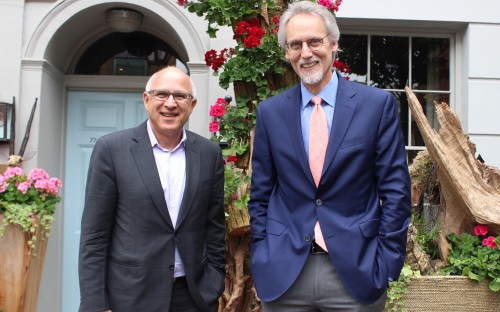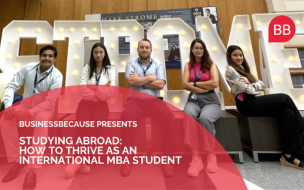“Historically, we have had diverse communities. But, the MBA has seen growth in every part of the world except the US.”
There was a rumor prior to the election of Donald Trump, Bill says, that a deal was close to make it easier for non-domestic students to obtain visas post-graduation. Of course, that’s been thrown out of the window under the current administration.
International students feel it’s imperative they remain in the US after graduating—higher tuition fees can only be paid off with the higher wages on offer in America. Obviously, if there is no guarantee of a job after graduating, it’s too much of a risk to rely on wages back home to pay off the massive debt accrued while at business school in the US. So, they cross it off their list of options.
On top of that, nationalist rhetoric—a global tide not exclusive to the US—creates a hostile atmosphere for internationals. Families begin to worry, encouraging their children to study elsewhere. Sangeet explains that GMAC have looked at data suggesting it’s no longer the case that international students can take things like safety and security for granted anymore, in places like the US.
That places a lot of responsibility on business schools to enact a change in tone, and to harness an atmosphere of collaboration, and security, on their campuses and beyond.
Bill admits that business schools need to do a better job at communicating the relevance and benefits of globalism. The recent retreat into a nest of nationalistic sentiment shows that opinion against freedom of movement and integration is shifting.
“The storyline that seems to have taken hold in various parts of the world seems to be that globalism means someone else takes your job in another part of the world,” Bill explains, “and that becomes a very negative thing.”
Without a strategy in place to tackle that view, Bill adds that economic vitality is at risk. Take a look at the Fortune 500—a list of America’s 500 largest corporations by revenue.
Research into the origin of the companies’ founders or co-founders by the Center for American Entrepreneurship, a non-partisan policy and advocacy organization, found that 43% of companies in the list were founded or co-founded by an immigrant or by the child of an immigrant.
Among the top 35 companies, that figure rises to 57%. In 2016, the 216 companies represented by the 43% were responsible for $5.3 trillion of global revenue and employed 12.1 million people around the world.
Read more into the back stories of these entrepreneurs and you realize that they found refuge on US soil. The Brookings Institute, a think tank based in Washington, describes them before they reached America as ‘poor, young, and fleeing harsh economic and political conditions’.
“The idea that by closing your doors you make things more prosperous is false,” Bill deplores, “and that opinion is shared by my colleagues.”
The US relies on the innovation and creativity of immigrant entrepreneurs as much as it does its domestic students. There must be room for a unified voice speaking for cross-border collaboration. GMAC can provide that platform—not in the sense of placing the US as the only go-to destination for business school candidates, but by reinforcing the idea that applicants should be able to study and move freely, wherever they wish.
“At Duke, we try to work hard for a diverse student body,” explains Bill. “We work hard with current students and alumni to activate their networks and show prospective students that we have a warm community, and the rhetoric you hear [around immigration] will not have any bearing on the experience you have on a program at Duke—that is very effective for us.”
Business schools need to be the instigators of the free mobility of talent that will drive economic growth. “Fragmenting the global talent market into national boundaries is not good for a nation or for the world overall,” says Sangeet.
“That ability to work in a classroom together on a problem builds cross-cultural sensitivity,” he continues, “that is invaluable over the course of your career.”
READ: Why Trump’s America Poses ‘A New Leadership Challenge’—Duke Fuqua Dean Bill Boulding
Blame The Ex-ecutives
Since the global financial crisis over a decade ago, business has found itself under an intense public microscope. Whereas investment bankers and avaricious executives threw caution to the wind in the build up to 2007’s crash and gave rise to a global hurricane that tore through the proletariat, the new wave of business school graduates are a litmus test that will reveal the extent to which business is worthy of a revamped, ethical epithet.
The behavior of the former executives of a decade ago means we have to change the word ‘business’ from a pejorative hell-bent on selfishness to one associated with altruism, and the creation of jobs and opportunity for the underserved.
“Part of it has to be a focus on innovation, and a lot of innovation today leads to job elimination and the concentration of wealth in a couple of founders, and billionaires who pop up overnight,” says Bill.
“That’s not a very appealing story, so we have to be able to tell the stories about innovation that [show] innovation for underserved markets. How are we shaping the future of work in a positive way that’s not about eliminating jobs, but rather creating new, more interesting work.”
The message must show that things like free trade have societal benefits in the way they reduce the cost of goods and services. Delivering that message needs to be done in a way that the everyday citizen understands. Telling people that this way of operating is making their lives cheaper through verbosity riddled with business jargon will just allow taglines along the lines of ‘business: by the elite for the elite’ to fester.
In the US, Bill says, there is a tug-of-war between Wall Street and Main Street—the latter being the term for the overall economy and individual employee, in contrast to Wall Street’s financial markets and major corporations.
Student Reviews
Duke University Fuqua School of Business
RECAPTHA :
0d
c2
39
e4









